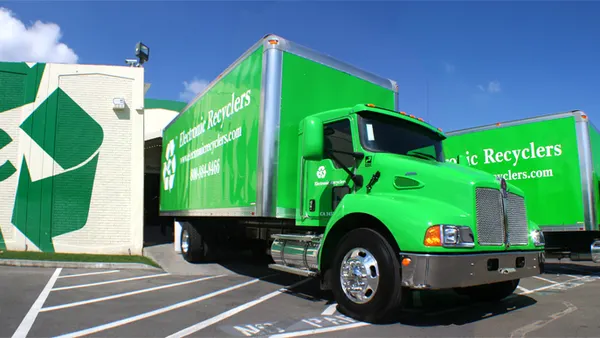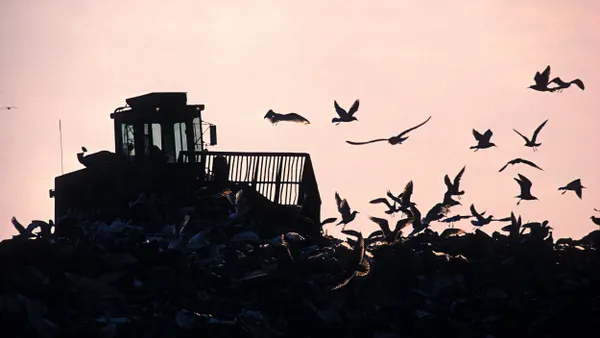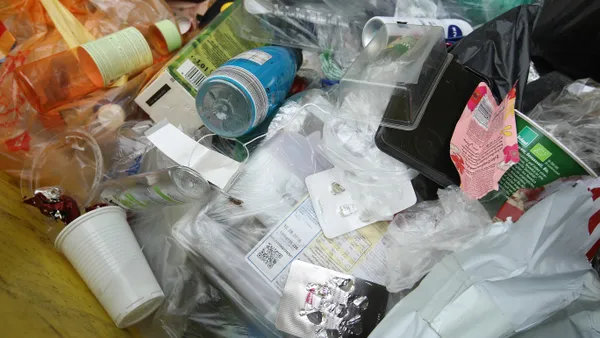UPDATE Dec. 12, 2017: After weeks of consideration, Boston Mayor Marty Walsh signed bag legislation into law Dec. 15, as reported by NECN and others. Walsh's main concern, which he expressed even after signing the bill, was how these fees could affect low-income or fixed-income residents.
The bill would have automatically become law without his signature by Dec. 18, unless he chose to veto it. In the weeks since the Nov. 29 council vote, Walsh's office had received pressure from both sides of the issue.
Supporters of the bill, led by the Mass Green Network, submitted a letter endorsed by dozens of community representatives. A former state senator who now represents Novolex sent a letter questioning the bill's constitutionality, particularly a provision that allows retailers to keep fees, as reported by MassLive.
Dive Brief:
- The Boston City Council voted in favor of an ordinance banning single-use plastic bags and adding a 5-cent fee, which stores will keep, on paper bags with handles and thicker reusable plastic bags. The vote was unanimous, and the one absent member sent in a statement of support.
- There would be a one-year implementation period before this takes effect, during which time council members plan to work with the Boston Housing Authority, Office of Energy, Environment and Open Space, and community groups to make free reusable bags available.
- The bill requires approval from Mayor Marty Walsh, who has withheld his endorsement of the proposal. City officials have previously said they preferred to address bags as part of a broader "zero waste" planning process.
Dive Insight:
Boston's surrounding neighbors have had bag bans or fees in place for multiple years, but advocates found it more difficult to advance a similar policy in the state's capital. Efforts began to ramp up in the spring of 2016, driven by organizations such as the Sierra Club and Mass Green Network. The council initially held a public hearing last year, followed by multiple working group sessions this year, and momentum behind this final push picked up after Thanksgiving.
Prior to the vote, lead sponsor Councilor Matt O'Malley called the work involved "Sisyphean" and praised the level of community engagement. According to O'Malley, an estimated 357 million bags are used in Boston each year and local MRF operator Casella receives 20 tons of bags from single-stream recycling carts each month. He defended the proposal against criticism by saying Boston had consulted with multiple cities around the country to craft the final language.
“We have seen conclusively that these initiatives work," said O'Malley during the council meeting. "We know what the recipe is, how we can do this, and the benefits cannot be challenged."
Council President Michelle Wu, who was a co-sponsor and worked to push the bill through before her leadership term ends this year, described its significance in broader environmental terms.
"This plastic bag ordinance is one example of a small step that is completely within the city’s control to take," she said. "There is a tremendous cost to doing nothing on every single one of these climate initiatives."
In a sign of the increasing interest in waste-related environmental issues, this vote happened while a city webinar about the new "zero waste" planning process was being hosted in the same building. Boston's new Zero Waste Plan Advisory Committee will hold its first meeting on Jan. 4.
This marks a significant milestone for advocates organized by the Mass Green Network, which has helped to nearly double the number of local bag ordinances over the past year. If this becomes law, Boston will be the 60th municipality to pass a bag ordinance in the state.
While that is still a small percentage of the 351 municipalities in Massachusetts, it could serve as a tipping point for statewide action because of conflicting local language. Bills have unsuccessfully been introduced at the state level for multiple years. The latest one received a hearing in October.
Opponents of bag bans or fees say that Boston's policy is similarly flawed and could have unintended consequences by increasing plastic usage for thicker bags. California is the only state to have passed a statewide policy, and only after a protracted referendum process, so any such debate in Massachusetts may not be an easy one.











